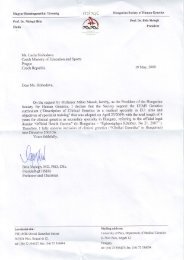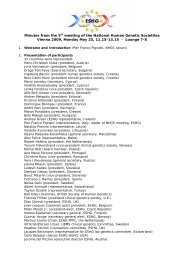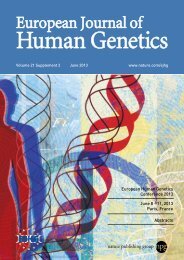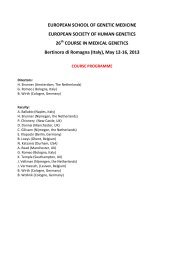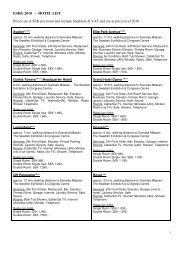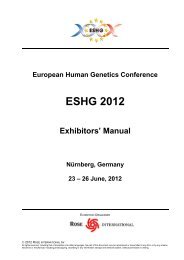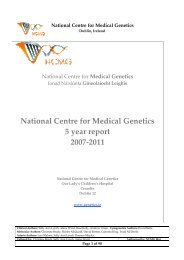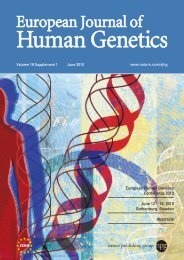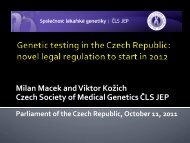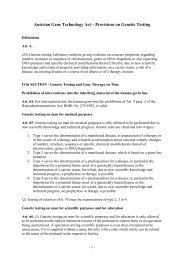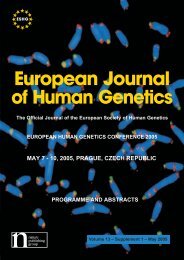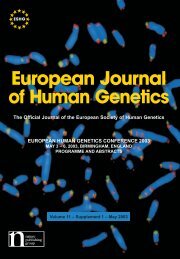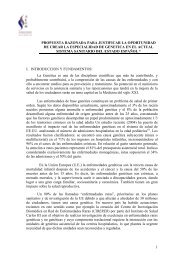2008 Barcelona - European Society of Human Genetics
2008 Barcelona - European Society of Human Genetics
2008 Barcelona - European Society of Human Genetics
Create successful ePaper yourself
Turn your PDF publications into a flip-book with our unique Google optimized e-Paper software.
Cancer genetics<br />
for endometrial carcinogenesis and invasion .<br />
P04.016<br />
Identification <strong>of</strong> four new patological mutations in HNPCC<br />
patients <strong>of</strong> the Basque country<br />
C. Martinez-Bouzas1 , E. Beristain1 , N. Puente-Unzueta1 , N. Viguera1 , E. Ojembarrena1<br />
, J. Errasti2 , K. Mugica3 , M. I. Tejada1 ;<br />
1 2 Hospital de Cruces, Barakaldo, Spain, Hospital de Txagorritxu, Vitoria-Gasteiz,<br />
Spain, 3Instituto Oncologicao de Gipuzkoa, San Sebastian, Spain.<br />
Hereditary non-polyposis colorectal cancer (HNPCC) is the most common<br />
form <strong>of</strong> hereditary colorectal cancer (CRC), accounting for 1%-<br />
5% <strong>of</strong> cases and is associated with germline mutations in the mismatch<br />
repair genes (MMR) . We have studied families with HNPCC for<br />
three years granted by the Public Health Department <strong>of</strong> the Basque<br />
Country . The aim <strong>of</strong> this work is to establish whether the proportion<br />
<strong>of</strong> mutation in our population is similar to others previously published .<br />
Fifty-five index cases were analysed using heteroduplex, sequencing<br />
and MLPA. Thirty patients fulfilled the Amsterdam criteria and twentyfive<br />
fulfilled the Bethesda criteria. Ninety relatives were also tested.<br />
We found in total twenty-three variatons (41 .8%): eight (14,5%) in<br />
MLH1; nine (16,4%) in MSH2; and six (10,9%) in MSH6 . Of these<br />
variations, eighteen were pathologic mutations, four <strong>of</strong> them being<br />
novel . Furthermore, other three new variations were found, but without<br />
aminoacid change . The 43 .3% <strong>of</strong> Amsterdam criteria patients had one<br />
pathological mutation and so had 28% <strong>of</strong> the Bethesda criteria . Of the<br />
thirty-nine relatives with mutation, six have only developed cancer . The<br />
majority <strong>of</strong> pathological mutations in Amsterdam criteria were found in<br />
the MLH1 and MSH2 genes . In the MSH6 the pathological mutations<br />
were found in Bethesda criteria patients, that presented many different<br />
types <strong>of</strong> cancer . In this study we haven’t found any rearrangements in<br />
the MLH1 gene, as were described in other populations . In conclusion,<br />
with this work we are contributing these new mutations to the wide<br />
spectrum that alredy exits .<br />
P04.017<br />
Uncertain pathogenicity <strong>of</strong> msH2 variants N127s and G322D<br />
challenges their classification<br />
S. Ollila 1 , D. Dermadi Bebek 1 , M. Greenblatt 2 , M. Nyström 1 ;<br />
1 Departmet <strong>of</strong> Biosciences, Division <strong>of</strong> <strong>Genetics</strong>, University <strong>of</strong> Helsinki, Helsinki,<br />
Finland, 2 Vermont Cancer Center, University <strong>of</strong> Vermont, Burlington, VT,<br />
United States.<br />
Hereditary non-polyposis colorectal cancer (HNPCC) is associated<br />
with germline mutations in mismatch repair (MMR) genes . Inherited<br />
missense mutations, however, complicate the diagnostics since they<br />
do not always cause unambiguous predisposition to cancer . This leads<br />
to variable and contradictory interpretations <strong>of</strong> their pathogenicity .<br />
Here, we establish evidence for the functionality <strong>of</strong> the two frequently<br />
reported variations, MSH2 N127S and G322D, which have been described<br />
both as pathogenic and non-pathogenic in literature and databases<br />
. We report the results <strong>of</strong> three different functional analyses<br />
characterizing the biochemical properties <strong>of</strong> these protein variants in<br />
vitro . We applied an immunoprecipitation assay to assess the MSH2-<br />
MSH6 interaction, a bandshift assay to study mismatch recognition<br />
and binding, and a MMR assay for repair efficiency. None <strong>of</strong> the experiments<br />
provided evidence on reduced functionality <strong>of</strong> these proteins<br />
as compared to wild-type MSH2 . Our data demonstrate that MSH2<br />
N127S and G322D per se are not sufficient to trigger MMR deficiency.<br />
This together with variable clinical phenotypes in the mutation carriers<br />
suggest no or only low cancer risk in vivo .<br />
P04.018<br />
Familial and clinicopathological differences in Amsterdamfamilies<br />
according to their mismatch repair status<br />
M. Pineda 1 , L. Benito 2 , C. Yagüe 2 , M. Salinas 2 , C. Lázaro 1 , S. González 1 , G.<br />
Capellá 1 , I. Blanco 2 ;<br />
1 Laboratori de Recerca Translacional, Institut Català d’Oncologia, Hospitalet de<br />
Llobregat, Spain, 2 Unitat de Consell Genètic, Institut Català d’Oncologia, Hospitalet<br />
de Llobregat, Spain.<br />
The aim <strong>of</strong> this study was to establish the familial and clinicopathological<br />
differences within Amsterdam-families according to their mismatch<br />
repair (MMR) status .<br />
Seventy families fulfilling Amsterdam criteria II were included. MMR<br />
status was determined by microsatellite analysis and/or immunohisto-<br />
chemistry <strong>of</strong> MMR proteins . Families with microsatellite instability and/<br />
or loss <strong>of</strong> expression <strong>of</strong> MMR proteins were considered MMR-deficient.<br />
Families were classified in three groups: A: MMR mutation detected<br />
(Lynch syndrome) (n=36); B: MMR-deficient families with no MMR mutation<br />
detected (n=10); and C: MMR-pr<strong>of</strong>icient families (n=24).<br />
Proband’s age <strong>of</strong> diagnosis was younger in Lynch syndrome families<br />
(A, 40 y; B,50; C, 46 y; p=0 .028) . The presence <strong>of</strong> extracolonic tumors,<br />
the absence <strong>of</strong> polyps and the number <strong>of</strong> first-degree relatives with<br />
HNPCC-associated tumors were higher in Lynch syndrome families .<br />
MMR-pr<strong>of</strong>icient families showed a predominance <strong>of</strong> left colon tumors<br />
with no mucinous phenotype and a lower presence <strong>of</strong> metachronous<br />
tumors .<br />
These results confirm that the presence <strong>of</strong> a MMR mutation is associated<br />
with an specific phenotype, while MMR-deficient families with no<br />
detected mutation show a mixed phenotype likely reflecting misclassification.<br />
P04.019<br />
Pathogenicity analysis <strong>of</strong> six unclassified missense variations in<br />
MMR genes identified in a selected population <strong>of</strong> Castilla-León<br />
(spain)<br />
L. Pérez-Cabornero 1 , E. Velasco 1 , M. Infante 1 , D. Sanz 1 , N. Martinez 1 , L.<br />
Hernández 1 , N. Martínez 1 , E. Lastra 2 , C. Miner 1 , M. Durán 1 ;<br />
1 IBGM, Valladolid, Spain, 2 Hospital General Yagüe, Burgos, Spain.<br />
Lynch syndrome is the most common hereditary syndrome predisposing<br />
to colorectal cancer . Mostly, it is caused by DNA variations in the<br />
DNA mismatch repair (MMR) genes MLH1, MSH2 and MSH6 . Of considerable<br />
relevance in the clinical management <strong>of</strong> colorectal cancer is<br />
to know if the missense variants referred to as unclassified variants<br />
(UVs) are or not cancer-causing . We report the mutational screening<br />
<strong>of</strong> 100 index cases from the Counsil <strong>Genetics</strong> Unit <strong>of</strong> Castilla-León.<br />
Of the 21 (21%) who carried germline mutation, 11 (52%) were categorized<br />
as pathogenic (frameshift, large rearrangements, splicing<br />
defects) and 10 (48%) as unclassified missense variants. The focus<br />
<strong>of</strong> this report is the classification <strong>of</strong> six <strong>of</strong> these missense variants as<br />
bening or pathogenic: MLH1 c .1852_1853AA>GC p.K618A; MLH1<br />
c .2146G>A p.V716m; MSH6 c .2633 T>C p.V878A; MSH6 c .431 G>T<br />
p.s144i and two novel variations MSH6 c .3425 C>T p.t1142m; MLH1<br />
c .1574 G>A p.s505N. To test this, we have analyzed clinical and genetic<br />
aspects including i) comparison between allelic frequency <strong>of</strong> the<br />
variant in the cases and 700 unaffected controls from a National DNA<br />
Register ii) a co-segregation study <strong>of</strong> the mutation with the disease<br />
within pedigree iii) evolutionary conservation <strong>of</strong> the involved aminoacid<br />
and type <strong>of</strong> aminoacid change iv) a prediction <strong>of</strong> the degree <strong>of</strong><br />
affectation at the protein function by two bioinformatics programs “Sort<br />
intolerant from tolerant” (siFt; http://blocks .fhcrc .org/sift/SIFT .html)<br />
and Polimorphism Phenotype (PolyPhen; www .bork .embl-heidelberg .<br />
de/PolyPhen) . The combination <strong>of</strong> all these approaches helps us to<br />
predict whether these contribute to the disease phenotype or merely<br />
represent rare polymorphisms<br />
P04.020<br />
A Database to support the clinical interpretation <strong>of</strong> <strong>Human</strong><br />
mismatch Repair Gene Variants<br />
R. H. Sijmons, R. M. W. H<strong>of</strong>stra;<br />
University Medical Center Groningen, Groningen, The Netherlands.<br />
Germline mutations in the mismatch repair (MMR) genes MLH1, MSH2,<br />
MSH6 and PMS2 can cause Lynch syndrome . Truncating MMR gene<br />
mutations generally <strong>of</strong>fer a clear handle for genetic counselling and<br />
allows for pre-symptomatic testing . In contrast, the clinical implications<br />
<strong>of</strong> most missense mutations and small in-frame deletions detected in<br />
patients suspected <strong>of</strong> having Lynch syndrome are unclear . We have<br />
constructed an online database dedicated to these unclassified variants<br />
(UVs) <strong>of</strong> the MMR genes . It can be easily searched for information<br />
on the results <strong>of</strong> functional assays and other findings, including tumour<br />
characteristics, segregation within families and frequency in controls .<br />
The clinical classification <strong>of</strong> MMR gene UVs will be a huge challenge.<br />
Recently formed committees within the International <strong>Society</strong> for Gastrointestinal<br />
Hereditary Tumours (InSiGHT) are working towards collecting<br />
data and developing classification algorithms. Our MMR gene<br />
missense database will be one <strong>of</strong> the tools to support that process . It<br />
can be searched at www .MMRmissense .org



